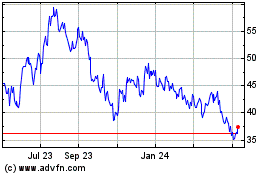Trump Taj Mahal Casino Workers Strike in Atlantic City
July 01 2016 - 5:10PM
Dow Jones News
Workers at the Trump Taj Mahal casino and hotel in Atlantic City
walked off the job early Friday morning and took to picket lines
after contract negotiations broke down this week.
Unite Here Local 54, the union representing nearly 1,000 Taj
workers, organized the strike after determining that the casino,
owned by activist investor Carl Icahn, wasn't offering a serious
proposal to cover their health insurance, union spokesman Ben
Begleiter said.
The company said in the statement that it was bargaining "in
good faith" with the union and threatened that the casino might
close as a result of the strike.
The Taj wasn't accepting hotel reservations for the next 10 days
on its website as of Friday afternoon. A company official said in
the statement that the casino was fully open and welcoming guests
through the July 4 holiday weekend and beyond.
Four Atlantic City casinos, including another one owned by Mr.
Icahn, avoided a threatened strike after coming to tentative terms
with the union earlier this week. The union had earlier determined
that it wouldn't strike the city's three other casinos. There are
eight casinos currently operating in the gambling enclave.
Full health coverage has long been a mainstay for casino
workers, who have traditionally been able to achieve stable,
middle-class service-industry jobs in gambling hot spots such as
Atlantic City and Las Vegas.
But that has broken down somewhat, especially in Atlantic City,
whose casino industry has been hit hard by bankruptcies,
private-equity ownership and the expansion of gambling elsewhere in
the mid-Atlantic region. Four casinos in Atlantic City have closed
in recent years.
The Taj, opened by Donald Trump in 1990, emerged from
bankruptcy, filed in 2014, earlier this year with Mr. Icahn taking
over ownership of the company, called Trump Entertainment Resorts
Inc. Mr. Trump lost control of the casino more than a decade ago.
The latest bankruptcy was the casino's fourth.
Mr. Icahn won in bankruptcy court approval to eliminate union
pensions and health-insurance benefits, arguing that restoring them
would force him to close the casino. The decision was upheld
earlier this year by a federal appeals court.
In a recent survey, the union found that one-third of Taj
workers had no health insurance, while 50% were on
taxpayer-subsidized insurance, Mr. Begleiter of the union said.
"Historically there has been free family health care and workers
have given up wages over the years to maintain that," Mr. Begleiter
said. That is why, he said, "when Taj took [the health insurance]
away it was like a double slap in the face. Health insurance has
always been the No. 1 issue among our workers."
Taj Chief Executive Tony Rodio said in a statement that the
company had offered health benefits that included employer
contributions.
"The employees of the Taj Bargaining Committee seem hellbent on
trying to close this property and killing the jobs and livelihood
of the other Taj employees including their own union members and
members of other unions notwithstanding the fact that Taj ownership
has presented good faith concrete progressive proposals to restore
certain employee benefits including contributions toward employee
health care," Mr. Rodio said.
"They are hurting their own and everybody else during the
busiest time of the year".
The health-care situation at the Taj had complicated
negotiations with other casinos because the union contracts allow
other casinos to adopt the contract that is most advantageous to
the employer, several people involved in negotiations for casinos
and the union said.
Despite that, the union earlier in the week came to tentative
contract agreements with Caesars Entertainment Corp., which owns
three casinos in Atlantic City, and the Tropicana casino, also
owned by Mr. Icahn. The union decided not to strike those
properties as a result. Those tentative deals still need to be
presented to the union's workers, union officials said. They
include maintaining full free health coverage, Mr. Begleiter
said.
The previous strike in Atlantic City occurred in 2004, when
10,000 workers went on strike against seven Atlantic City casinos,
and lasted 34 days.
Write to Alexandra Berzon at alexandra.berzon@wsj.com
(END) Dow Jones Newswires
July 01, 2016 16:55 ET (20:55 GMT)
Copyright (c) 2016 Dow Jones & Company, Inc.
Caesars Entertainment (NASDAQ:CZR)
Historical Stock Chart
From Mar 2024 to Apr 2024

Caesars Entertainment (NASDAQ:CZR)
Historical Stock Chart
From Apr 2023 to Apr 2024
